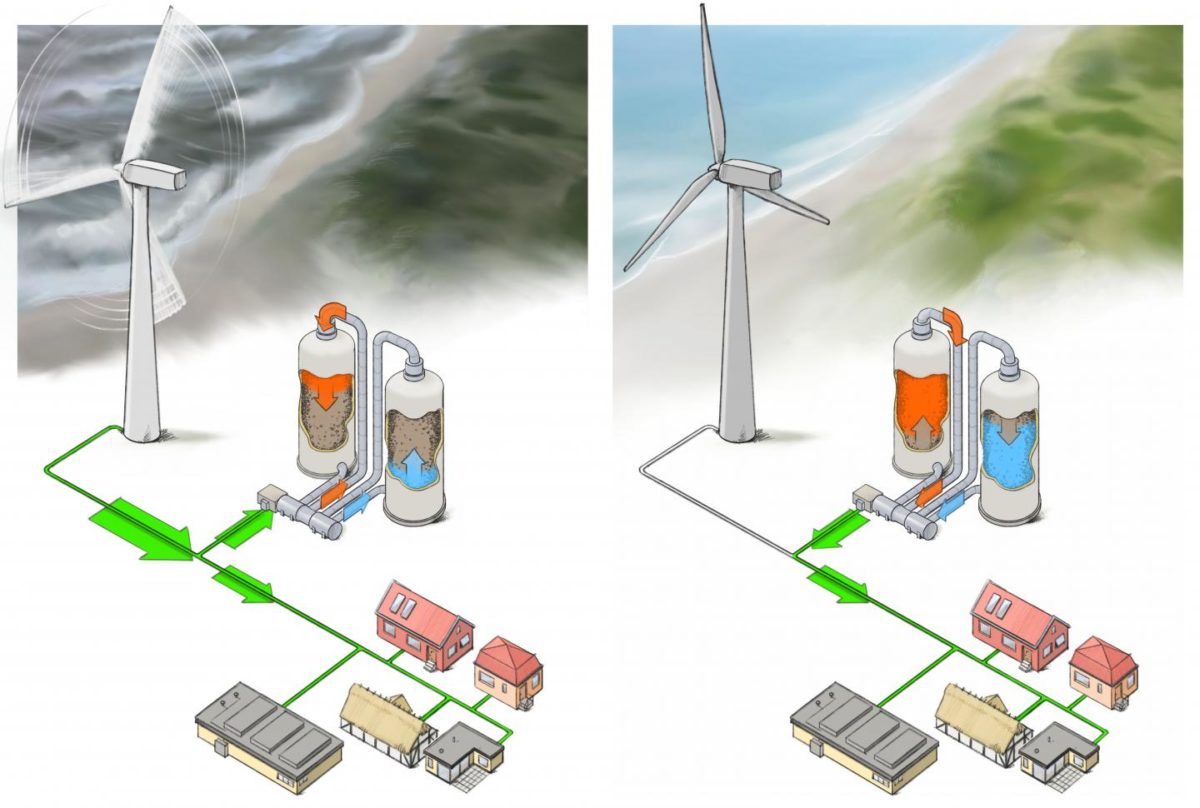Denmark's Aarhus University (AU), Danish renewable energy company Stiesdal, and energy provider Andel Holding A/S are planning to develop a 10 MWh storage system that is able to store renewable energy, in the form of heat, into crushed, pea-sized stones made of basalt, which is one of the most abundant materials in the earth's crust.
Called GridScale, the stone storage system is described as a cheap and efficient alternative to lithium-based batteries and is claimed to enable the storage of renewable electricity for around a week.
In the proposed project, the electricity produced by a large scale renewable energy generator is used to power a system of compressors and turbines which in turn pumps heat energy from one or more storage tanks filled with cool stones to an equal number of storage tanks filled with hot stones.
When this process is activated, the cold stones see their temperature further drop and the hot stones, by contrast, become much hotter and reach temperatures close to 600 degrees Celsius. “The heat can be stored in the stones for many days and the number of sets of stone-filled tanks can be varied, depending on the length of storage time required,” the researchers specified.
When the stored energy is needed, the reverse process is applied, which makes the stones in the hot tanks become colder and those in the cold tanks become warmer, and the released thermal energy can be used for different applications.
“Basalt is a cheap and sustainable material that can store large amounts of energy in small spaces and that can withstand countless charges and discharges of the storage facility,” said Andel's scientist, Ole Alm.
When built, the system will be connected to a wind power plant and will become Denmark's largest storage facility. “It will definitely be in the eastern part of Denmark, in south or west Zealand or on Lolland-Falster, where production from new large PV units in particular is growing faster than consumption can keep up,” the consortium explained.
The DKK35 million (€4.7 million) project is being funded with DKK21 million (€2.8 million) from the Energy Technology Development and Demonstration Program (EUDP). The group of participants includes the Technical University of Denmark (DTU), Welcon, BWSC Burmeister Wain Scandinavian Contractor, Energi Danmark, and Energy Cluster Denmark.
According to a document published by the California Energy Commission last year, Stiesdal had also proposed to build a large scale pilot project in the U.S., in partnership with Magellan Stortech. “A GridScale system coupled with a solar farm could be configured to charge for eight hours and discharge for 16 hours, in order to enhance the system value of the solar power,” the document read.
The system is described as a sort of giant heat pump, and one of the main challenges for its implementation is to identify a stone size that provides a good thermal gradient with a low-pressure drop.
The storage technology is also claimed to have no location requirement, low round-trip energy cost, high energy density, a small footprint, and round trip efficiency of 35-60%. Its developers believe it could be, potentially, scaled up to a capacity of up to 1 GW and a storage capacity of 100,000 MWh.
Basalt-based storage was identified in previous research as a suitable storage material for concentrated solar tower power plants.
This content is protected by copyright and may not be reused. If you want to cooperate with us and would like to reuse some of our content, please contact: editors@pv-magazine.com.




“and round trip efficiency of 35-60%”
That’s a bit of a wide range. Which is it? At 60%, it’s competitive with hydrogen and liquid air.
At 35% it’s competitive with nothing and has no hope.
Possibly, 60% is for harvesting as heat and 35% is for harvesting as electricity,since heat engines typically have that sort of efficiency. I wouldn’t rule out viability for the latter. Remember, the input electricity now costs 1c-2c per kwh LCOE, and 10c/kwh is a reasonable price to pay for peaking backup.
In an interview with the company they state that its has a round trip efficiency of about 60%. In these tests, the heat is simply lead out into the air.
They go on to say, that connected to the heat network, this heat could be further utilized, and it is their expectation that the model then would be more than 90% effective.